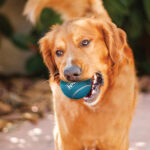
Golden Retrievers are known for their friendly demeanor, loyalty, and boundless energy. However, as they age, their needs change significantly. Caring for a senior Golden Retriever requires attention to specific health concerns, dietary adjustments, and tailored exercise routines to ensure they remain healthy and happy in their golden years.
Addressing Health Concerns for Senior Golden Retrievers
As Golden Retrievers age, they become more susceptible to various health issues. Here are key areas to monitor and manage:
Arthritis and Joint Pain
Due to their size and propensity for joint issues, senior Golden Retrievers are prone to arthritis and joint pain. It’s important to:
- Monitor your dog for signs of discomfort, such as limping or difficulty getting up.
- Provide a comfortable, supportive bed to alleviate pressure on their joints.
- Consider joint supplements like glucosamine and chondroitin to support mobility.
- Consult your veterinarian for appropriate pain management options.
Weight Management
Maintaining a healthy weight is crucial for senior Golden Retrievers, as obesity can exacerbate joint problems and strain the heart. To manage their weight:
- Feed a high-quality, age-appropriate diet.
- Ensure proper portion control to prevent overeating.
- Incorporate regular, low-impact exercise to keep them active.
Dental Health
Dental health is often overlooked but is vital for your dog’s overall well-being. Poor dental health can lead to gum disease and tooth loss, impacting their ability to eat. To maintain oral health:
- Regularly brush your dog’s teeth with a canine toothbrush and toothpaste.
- Provide dental chews or a dental care diet.
- Schedule regular dental check-ups with your veterinarian.
Heart Health
Golden Retrievers are prone to heart conditions as they age. To support heart health:
- Include foods rich in omega-3 fatty acids in their diet.
- Monitor their weight to prevent obesity, which can strain the heart.
- Regular check-ups with your veterinarian are essential for early detection and management of heart issues.
Eye Health
Senior Golden Retrievers often develop cataracts and other eye conditions. Keep an eye on their vision and consult your veterinarian if you notice any changes.
Ear Care
Golden Retrievers with floppy ears are more prone to ear infections. Regularly clean their ears and watch for signs of infection, such as redness, odor, or scratching.
Dietary and Nutritional Guidelines
Proper nutrition is critical for the health of senior Golden Retrievers. Here are some guidelines to follow:
High-Quality, Age-Appropriate Diet
Feed your aging Golden Retriever a diet specifically formulated for senior dogs. These diets are designed to support overall health and manage weight.
Portion Control
Proper portion control is essential to prevent obesity. Follow the feeding guidelines on your dog’s food packaging and adjust based on their activity level and weight.
Joint Health Supplements
Consider adding joint health supplements such as glucosamine and chondroitin to their diet to support mobility and manage arthritis pain.
Dental Care Diet
Provide dental chews or a dental care diet to help maintain oral health and prevent gum disease.
Omega-3 Fatty Acids
Include foods rich in omega-3 fatty acids to support heart health and maintain a healthy coat and skin.
Hydration
Monitor your dog’s water intake to prevent dehydration, which can be more common in senior dogs. Ensure fresh water is always available.
Veterinary Consultation
Consult with your veterinarian to create a tailored diet plan that meets your dog’s specific nutritional needs.
Exercise Routine for Senior Golden Retrievers
Exercise is important for senior Golden Retrievers but should be tailored to their age and physical condition. Here’s what to consider:
Low-Impact Exercises
- Leisurely Walks: Take your dog on slow, enjoyable walks to maintain mobility and manage weight without putting too much strain on their joints.
- Swimming: Swimming is an excellent low-impact exercise that helps maintain muscle strength and joint flexibility.
Short, Frequent Walks
Instead of one long walk, break up exercise into shorter, more frequent walks throughout the day. This prevents fatigue and overexertion.
Gentle Stretching Exercises
Incorporate gentle stretching exercises to help with flexibility and prevent muscle stiffness.
Mental Stimulation
Keep your dog’s mind sharp with activities like puzzle toys, obedience training, and interactive games.
Avoid High-Impact Activities
Avoid high-impact activities such as running and jumping, as these can worsen joint issues and increase the risk of injury.
Regular Playtime
Ensure your dog gets regular playtime in a safe and controlled environment to keep them active and social.
Veterinary Consultation
Always consult with your veterinarian before starting a new exercise routine to ensure it’s appropriate for your dog’s health.
Conclusion
Caring for a senior Golden Retriever requires attention to their changing needs, from health concerns to dietary adjustments and tailored exercise routines. By addressing these areas, you can ensure your aging dog remains healthy, happy, and comfortable in their golden years.
If you need further assistance, consider booking a consultation with one of our expert veterinarians who can provide personalized advice and care for your senior Golden Retriever.
FAQs
How often should I take my senior Golden Retriever to the vet?
It’s recommended to take your senior Golden Retriever to the vet for a check-up at least every six months to monitor their health and catch any potential issues early.
Can I still play fetch with my senior Golden Retriever?
While high-impact activities like fetch may not be suitable, you can modify the game to make it gentler, such as rolling the ball instead of throwing it.
What are the signs of arthritis in senior Golden Retrievers?
Signs of arthritis include limping, stiffness, difficulty getting up, reluctance to climb stairs, and decreased activity levels.
How can I help my senior Golden Retriever with weight management?
Feed a high-quality, age-appropriate diet, ensure proper portion control, and incorporate low-impact exercises to help manage their weight.








